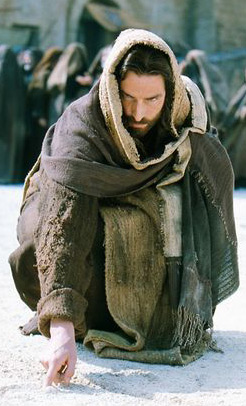Stories that Civilize
 Stories are potentially dangerous, at least the wrong ones.
Stories are potentially dangerous, at least the wrong ones.
A lot of parents lament profanity, sex, and violence in modern entertainment, but those, as I’ve lamented recently, are all found even in the Bible — in a context that explains their place. How do you tell the story of Jesus without cutting off the centurion’s ear and seeing the Master restore it? Would Samson lose his hair, and strength, to a homely girl, dressed head to ankles in a pressed denim dress? Love, hate, peace, violence, sex, and self-denial are all just a few of the many different colored cobblestones on the road to the end of the story.
The really dangerous narratives are the foggy ones–a montage of disturbing absurdity, the elevation of moral ambiguity as a virtue, nihilistic violence without justice, occult horror without any crusading priest to restore order. Tim Burton is good at that sort of thing. (I was powerfully depressed for a few days after seeing his absurd, Wicca version of “Sleepy Hollow.”) You can make people laugh, and cry, and still keep them drowning in their own absurd materialism.
On the other hand, some stories do more than just restore the soul. They actually create and sustain civilization. What is the story of the Passover but a chronicle that provides identity and solace to the chosen? What is the story of Jesus and the adulterous woman but the very mercy that Christian governors and judges have felt constrained to consider in every verdict since the scripture was first read? What is the story of Magna Carta and Runnymede, for those who were actually taught it, but an ancient memory of strength against injustice?
Not all stories, of course, achieve that sort of immortality, but I would argue the less of them you have, the worse off you are. As much as we may be entertained by them, can you imagine the halls of power ringing with great, comforting truths gleaned from “That 70s Show” or “Californication?” Can you imagine the President of the United States invoking “No Strings Attached” as he argues for public virtue? Will episodes of “Cougar Town” be retold around the campfire five generations from now?
On the other hand, that does seem to be George Bailey, Johnny Tremaine, Rob Roy, Braveheart territory, and that’s why I’m troubled when someone really seems to wonder why we should tell the story of Lexington, or the burning of the Gaspee, or the Stamp Act riots. It puzzles me when people don’t seem to have any reverence for the founders, or when they use them only to justify their own idiosyncratic take on current events. Most of all, when I see national mind-control cults like North Korea, I worry that any given generation is only a few decades away from a loss of cultural memory. Why do you think China is so intent on suppressing Christian worship? Real Christianity holds leaders to their Romans 13 obligations — to be just — and it actually proposes a truth, and a power, higher than man’s.
It proposes something like this, at its extreme, a willingness to die for justice, for freedom, for something greater than ourselves.
As we begin a new year of production, I think it’s terribly important to remind ourselves, at Colony Bay, that — even if we fail — it is far better to craft a story that aims to civilize, and not just entertain.
